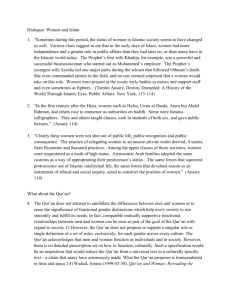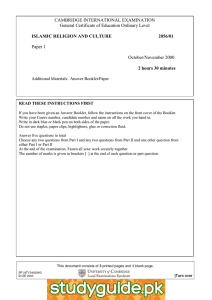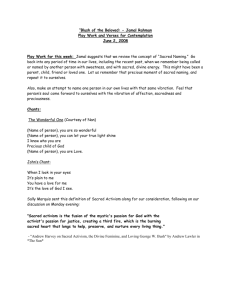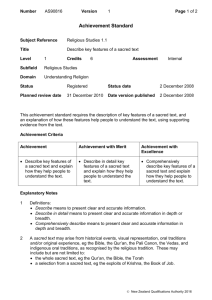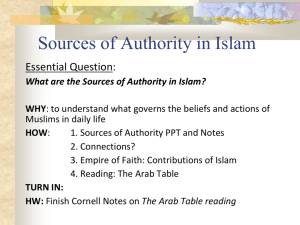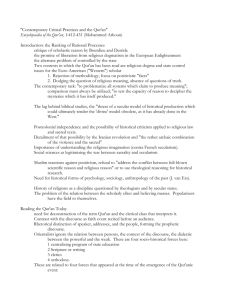MAPPING QUR’ANIC CARTOGRAPHY WITH REMOTE SENSING
advertisement
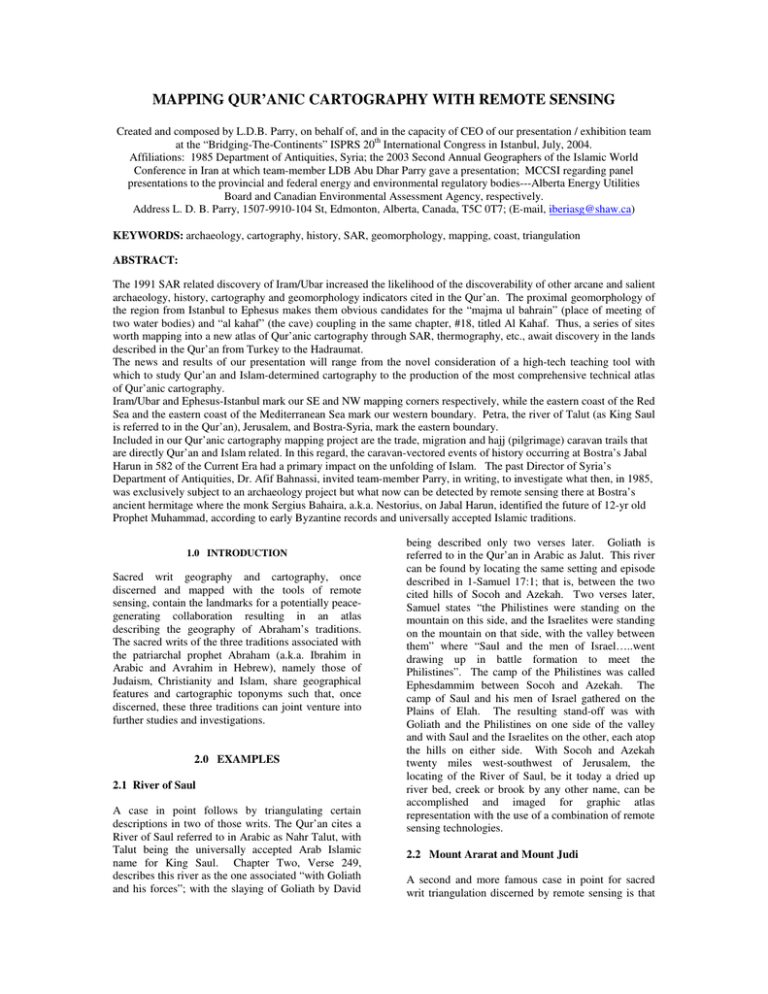
MAPPING QUR’ANIC CARTOGRAPHY WITH REMOTE SENSING Created and composed by L.D.B. Parry, on behalf of, and in the capacity of CEO of our presentation / exhibition team at the “Bridging-The-Continents” ISPRS 20th International Congress in Istanbul, July, 2004. Affiliations: 1985 Department of Antiquities, Syria; the 2003 Second Annual Geographers of the Islamic World Conference in Iran at which team-member LDB Abu Dhar Parry gave a presentation; MCCSI regarding panel presentations to the provincial and federal energy and environmental regulatory bodies---Alberta Energy Utilities Board and Canadian Environmental Assessment Agency, respectively. Address L. D. B. Parry, 1507-9910-104 St, Edmonton, Alberta, Canada, T5C 0T7; (E-mail, iberiasg@shaw.ca) KEYWORDS: archaeology, cartography, history, SAR, geomorphology, mapping, coast, triangulation ABSTRACT: The 1991 SAR related discovery of Iram/Ubar increased the likelihood of the discoverability of other arcane and salient archaeology, history, cartography and geomorphology indicators cited in the Qur’an. The proximal geomorphology of the region from Istanbul to Ephesus makes them obvious candidates for the “majma ul bahrain” (place of meeting of two water bodies) and “al kahaf” (the cave) coupling in the same chapter, #18, titled Al Kahaf. Thus, a series of sites worth mapping into a new atlas of Qur’anic cartography through SAR, thermography, etc., await discovery in the lands described in the Qur’an from Turkey to the Hadraumat. The news and results of our presentation will range from the novel consideration of a high-tech teaching tool with which to study Qur’an and Islam-determined cartography to the production of the most comprehensive technical atlas of Qur’anic cartography. Iram/Ubar and Ephesus-Istanbul mark our SE and NW mapping corners respectively, while the eastern coast of the Red Sea and the eastern coast of the Mediterranean Sea mark our western boundary. Petra, the river of Talut (as King Saul is referred to in the Qur’an), Jerusalem, and Bostra-Syria, mark the eastern boundary. Included in our Qur’anic cartography mapping project are the trade, migration and hajj (pilgrimage) caravan trails that are directly Qur’an and Islam related. In this regard, the caravan-vectored events of history occurring at Bostra’s Jabal Harun in 582 of the Current Era had a primary impact on the unfolding of Islam. The past Director of Syria’s Department of Antiquities, Dr. Afif Bahnassi, invited team-member Parry, in writing, to investigate what then, in 1985, was exclusively subject to an archaeology project but what now can be detected by remote sensing there at Bostra’s ancient hermitage where the monk Sergius Bahaira, a.k.a. Nestorius, on Jabal Harun, identified the future of 12-yr old Prophet Muhammad, according to early Byzantine records and universally accepted Islamic traditions. 1.0 INTRODUCTION Sacred writ geography and cartography, once discerned and mapped with the tools of remote sensing, contain the landmarks for a potentially peacegenerating collaboration resulting in an atlas describing the geography of Abraham’s traditions. The sacred writs of the three traditions associated with the patriarchal prophet Abraham (a.k.a. Ibrahim in Arabic and Avrahim in Hebrew), namely those of Judaism, Christianity and Islam, share geographical features and cartographic toponyms such that, once discerned, these three traditions can joint venture into further studies and investigations. 2.0 EXAMPLES 2.1 River of Saul A case in point follows by triangulating certain descriptions in two of those writs. The Qur’an cites a River of Saul referred to in Arabic as Nahr Talut, with Talut being the universally accepted Arab Islamic name for King Saul. Chapter Two, Verse 249, describes this river as the one associated “with Goliath and his forces”; with the slaying of Goliath by David being described only two verses later. Goliath is referred to in the Qur’an in Arabic as Jalut. This river can be found by locating the same setting and episode described in 1-Samuel 17:1; that is, between the two cited hills of Socoh and Azekah. Two verses later, Samuel states “the Philistines were standing on the mountain on this side, and the Israelites were standing on the mountain on that side, with the valley between them” where “Saul and the men of Israel…..went drawing up in battle formation to meet the Philistines”. The camp of the Philistines was called Ephesdammim between Socoh and Azekah. The camp of Saul and his men of Israel gathered on the Plains of Elah. The resulting stand-off was with Goliath and the Philistines on one side of the valley and with Saul and the Israelites on the other, each atop the hills on either side. With Socoh and Azekah twenty miles west-southwest of Jerusalem, the locating of the River of Saul, be it today a dried up river bed, creek or brook by any other name, can be accomplished and imaged for graphic atlas representation with the use of a combination of remote sensing technologies. 2.2 Mount Ararat and Mount Judi A second and more famous case in point for sacred writ triangulation discerned by remote sensing is that of Mount Ararat and Mount Judi where, although not found, Noah’s Ark is said to have settled as the biblical flood receded, according to the Hebrew Torah and the Arabic Qur’an, respectively. The Qur’an, in Chapter Eleven, Verse 44, states “The Ark rested on Judi plateau”. The Torah, in Genesis 8:4, states “the Ark came to rest on the mountains of Ararat”. While not presuming to think we can find the Ark, indeed a quixotic pursuit ending in failure with every attempt, the triangulation of the sacred writ locations has proven effective in unexpected ways. Mount Judi, a part of the Ararat Mountain mass and plateau, straddles an international site the Turkish sector of which has been recently studied. In the summer of 1995, Turkish experts identified an anomaly of unusual concentrations of iron oxide fitting in pattern distribution the Biblical description of the Ark. Perhaps iron oxide is all that is left of the Ark but nevertheless, remote sensing imagery graphically reproduced can provide a presentation of these and other findings for our proposed atlas. 2.3 The City of Pillars But it was the 1991 synthetic aperture radar (SAR) related discovery of Iram/Ubar in Oman that increased the likelihood of the greater discoverability of other arcane and salient archaeological, historical, cartographic, toponymic, antiquitous and geomorphologic indicators cited in the Qur’an. The Iram City of Pillars cited in the Qur’an, Chapter 89, Verses 1 and 14 (in Arabic referred to as Iram Dhat alImad), which came to be known as Ubar in the Arabian Nights literature, was detected with aerial remote sensing technology where and when trails were imaged leading to no discernable human settlement. On-ground remote sensing technologies were then plied resulting in the successful discovery of the urban centre of Iram which sunk into limestone caverns that had, over time, been drained of water by the residents of Iram. Iram and the caverns were slowly covered in sand within four centuries of the subsequent revelation of the Qur’an. This discovery put remote sensing (RS) in a new light with a new focus for sacred writ geography discernment. 2.4 Turkey Prospects An unprecedented, ambitious, perhaps quixotic project with profound implications using RS right here in Turkey would involve triangulating the likely hidden locations where the purging of sacred writ effects of Emperors Diocletian and Constantine could be identified. Paul, in 2-Timothy 4:13 directs his disciples to “bring the scrolls, especially the parchments” to him in another part of Turkey, from Troas. As it happens, Troas is not so far from the traditional seats of Diocletian and Constantine at Nicea, Izmit and Iznik. Granted, more than 200 years separate Paul from these Emperors, but the mere chance of locating “the scrolls, especially the parchments” Paul referred to, is a chance worth taking, particularly when those scrolls and parchments are at best certainly and at least plausibly what the Qur’an refers to as the Injil in Chapter Five, Verses 49-51. As one of the famous translators and commentators of the Qur’an put it, “The Injil spoken of by the Qur’an is not the New Testament. It is not the four Gospels now received as canonical. It is the single Gospel which was revealed to Jesus and which he taught” (page 287, A.Y. Ali, published by Kamal Muslim Trust-Publications of Presidency of Islamic Courts and Affairs, State of Qatar, 1946). The likelihood of this and related sacred writs being ensconced in the Turkish areas of Biblical Ephesus, Troas, Bithynia, Nicea, Iznik and Izmit, is more than plausible, as it was from this general region that Emperor Diocletian put out the order to destroy all Christian writs, and Emperor Constantine more selectively put out the order to purge all Christian writs which did not conform to his model of empire, per the Council of Nicea and thus the Nicean Creed. Finding the Injil or related writs might be like finding a needle in a haystack, but not if this sacred writ atlas project is realized up to our expectations when that haystack would then be baled up, one bale at a time, leaving just such a needle there for the discerning investigator’s taking. The number of other sacred writ geographical indicators this project would endeavor to discern with RS is such that even if Paul’s “scrolls, especially the parchments” cannot be found, the atlas would still reach completion without any loss and with much knowledge gained. 3.0 TERRITORY OF STUDY Iram/Ubar and Ephesus-Istanbul mark our SE and NW mapping corners respectively, while the eastern coast of the Red Sea and the eastern coast of the Mediterranean Sea mark our western boundary. Historical Saba, a.k.a. Shabwah and Sheba of the Qur’an and the Bible, mark our southwestern corner. Ararat-Judi marks our northeastern corner. Occasional incursions into historical Biblical Cyrene of Libya, into Egypt, Rome and Persia would complete the sacred writ territory we would encompass in this project. A particularly important incursion would include the area of Arcadia in Greece. Included in our sacred writ mapping project are the trade, migration and hajj (pilgrimage) caravan sarai (hospitable camping) trails directly related to Jerusalem, Mecca, and Bostra (of Syria, not Basra of Iraq). The caravan-vectored events of history occurring at Bostra’s Jabal Harun (Mount Harun) in 582 of the Current Era had a primary impact on the unfolding of Islam and its relationship to Christianity. It was to here where the Council of Ephesus of ancient Turkey banished the then new order of Christian Nestorians which was, generations later, to produce a monk named Bahaira who bore a sacred writ titled the Tabdil (both Bahaira and Tabdil are Aramaic terms). This monk, with his sacred writ that is said to have been passed down over the decades and generations, identified twelve year old Muhammad as the expected Mustapha when Prophet Muhammad was part of his uncle Abu Talib’s trade caravan. In written correspondence, the past director of Syria’s Department of Antiquities, Dr. Afif Bahnassi, invited our team CEO in writing to investigate what then, in 1985, was exclusively subject to an archaeology project but what now can be detected by RS there at Bostra’s ancient hermitage where the monk Sergius Bahaira, a.k.a. Buhaira and Nestorius, identified the indicators of Muhammad’s calling, according to available early Byzantine records and universally accepted Islamic traditions. This hermitage at Jabal Harun is now a tourist attraction. 4.0 CONCLUSION The examples given in this presentation of nexus and plexus patterns of sacred writ geography and cartography are but a few of the many we will be exploring and incorporating in our final RS atlas. If you are interested in joining this project either as a sponsor, investor or with technical assistance, please arrange with us a meeting during this ISPRS 20th Congress. Regional support garnered to date will be discussed at that time, but suffice it to state and conclude that a project such as this, while preferred to be generated in the private sector, also requires a consultative Grand Council of Abraham. 4.1 Grand Council of Abraham This council would consist of appropriate representatives of those relevant sacred writs with which the geography identified in this paper can be discerned by RS. While the atlas itself will be nonsectarian, the Grand Council of Abraham would be composed of the three sectors of Abrahamic monotheism and the sub-sectors within those three. Judaism would have representation from the reform, conservative and orthodox sub-sectors, Christianity would likewise have representatives from the catholic, protestant, and orthodox sub-sectors, and Islam would have Sunni, Shi’ite and reform-to-orthodox representation. This task has already begun with Ayatollah Ghaemagani, the Shi’ite fiqh (jurisprudence) specialist of Tehran, agreeing to participate, as have Sunni and Shi’ite Muslim representatives of the Islamic Campus Ministry affiliated with the University of Alberta Chaplain’s Association. This listing of those who support our effort is substantially longer as the conclusion of this paper will demonstrate. It is important to have appropriate and competent Hebrew and Arabic translators combined with relevant religious representatives put to task in a combined effort so as not to breech any protocols in this the most sensitive aspect of our undertaking. 4.2 The Tent Such a Grand Council of Abraham has indeed happened in recent history. The famous TENT OF MEETING, created by Michele Zackheim in the 1980s was introduced in the Ottawa Citizen newspaper by Mohammad Azhar Ali Khan in a feature article with the heading “Tent of Meeting: Prophet Abraham would have approved” as follows: “The Tent of Meeting is a Canadian milestone. The $400,000 collaborative project portrays Jewish, Christian and Islamic images and is based on the fact that the followers of the three great faiths have a common father, the patriarch Abraham, and so historically at least constitute one family” (page A9, The Citizen, Ottawa, June 26, 1986). The same can be said of our atlas project. Mohammad Azhar Ali Khan went on to state that “Honorary sponsors of the tent are the Canadian Council for Christians and Jews, the Christian Council of the Capital Area, the Ottawa Jewish Community Council and the Ottawa Muslim Association....Rabbi Arnold Fine, Agudath Israel Congregation….and Dr. Tawfiq Shahin, Imam of the Ottawa Mosque”. Another sponsor is a group titled Abraham and Friends, Inc. In personal correspondence, Michele Zackheim asked the author of this paper to “Please be so kind as to keep me informed of your findings and we will keep you informed about where THE TENT is going and when” (letter written to this project CEO, L.D.B. Parry, July 19, 1986). By way of another example to go in our sacred writ atlas by remote sensing, that is, the location of what Jews call Ha Mishkin, what Christians call the Tabernacle of the Wilderness, and Muslims call Buyut al-Sha’ar, we will indeed keep Michele informed of our findings. If good will prevails, insha’Allah (Allah willing), our exhibit will in fact be THE TENT OF MEETING! 5.0 ACKNOWLEDGEMENTS 5.1 Natural Resource Extraction Industry For our Team’s RS Panel Presentations, we wish to acknowledge coal, oil, gas and power companies including Suncor Energy, Cardinal River Coals and Epcor, for their sponsorship and/or financing of the costs of our RS panel presentations in recent years. These expert panels consisted of Dr. Gloria Fedirchuk, our Calgary-based archaeologist, Dr. Richard Nielsen, our Houston-based RS expert, his assistant and current project CAO Jeff Budinski, the Rocky Mountain Cree Smallboy Camp Chief and Council, and me, Project CEO and President/CEO of the MCCSI Institute in whose name our panel presentations were endorsed and funded. 5.2 Earlier Sources of Acknowledgement From the active interest the Syrian Director of Antiquities, Dr. Afif Bahnassi, took in Parry’s Bostra Jabal Harun project of the middle 1980s to recent expressions of participation in our atlas project from Iran’s religious scholars, namely Ayatollah Ghaemagani of Tehran in September 2003, these individuals are to be acknowledged for their roles in providing interest and moral support for this project over the years. In this regard, we wish to acknowledge the two remaining members of our team, Effah Ergil who is part of the Islamic Campus Ministry at the University of Alberta and serves the Edmonton Turkish community, and Zack Sheikh who is the senior Muslim chaplain at the University of Alberta, both of whom have been very active in this project’s linguistic and geographic research. 6.0 REFERENCES 6.1 Letters from Dr. Afif Bahnassi, Director General of the Department of Antiquities of Syria, January 21, 1984 and August 22, 1985, to LDB Parry 6.2 Certificate of membership awarded by the Iranian Geographical Association, September 17, 2003, to LDB Parry 6.3 Extensive Byzantine archives pertaining to the 6th and 7th Centuries of the Current Era 6.4 Various Islamic Hadith (recorded traditions) 6.5 The Torah 6.6 Other Old Testament Books 6.7 The New Testament 6.8 Pseudepigraphical, Apocalyptic, and Apocryphal Writings 6.9 The Holy Qur’an

